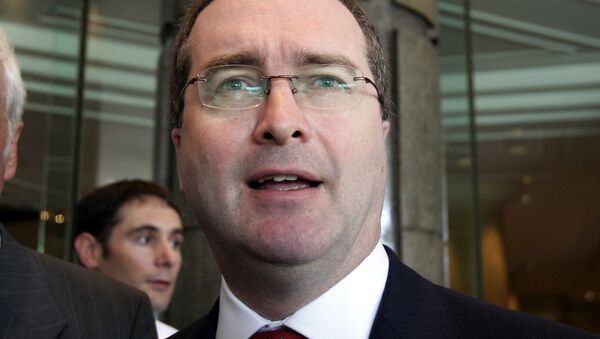MOSCOW, November 4 (RIA Novosti), Ekaterina Blinova — US tech giants' popular web platforms have become the 'command-and-control networks of choice' for terrorists, claimed Robert Hannigan, the director of the UK intelligence and security organization GCHQ, in an Op-Ed which was published by the Financial Times.
"The extremists of ISIS use messaging and social media services such as Twitter, Facebook and WhatsApp, and a language their peers understand. The videos they post of themselves attacking towns, firing weapons or detonating explosives have a self-conscious online gaming quality," points out the UK intelligence chief.
While al-Qaeda used to disseminate its materials anonymously through some secret sites, currently would-be jihadists can openly follow Islamic State supporters via popular social media venues, the intelligence chief emphasizes. Apparently, ISIS has seized the opportunities provided by the global web, "capitalizing on western freedom of expression." Moreover, terrorists are using advanced encryption techniques, which make them elusive. Pointing the finger squarely at the private sector, Hannigan suggests that it seems like the US tech giants have turned a blind eye to the Internet’s misuse by terrorists.
"GCHQ and its sister agencies, MI5 and the Secret Intelligence Service, cannot tackle these challenges at scale without greater support from the private sector, including the largest US technology companies which dominate the web," stresses Robert Hannigan, adding that the popular web services not only "host the material of violent extremism or child exploitation," but are used as "routes for facilitation of crime and terrorism."
The UK intelligence chief underscores that regardless of the fact that Silicon Valley may dislike it, its services have apparently become the "command-and-control networks of choice for terrorists and criminals." Hannigan insists that the US tech giants should facilitate "lawful investigation" by intelligence agencies in order to deal with the growing threat of global terrorism, stressing that privacy "has never been an absolute right."
In a response to Robert Hannigan's Op-Ed in the Financial Times, Eric King, the deputy director of Privacy International, expressed his deep concerns regarding the UK intelligence chief's approach to the internet security and privacy issue.
"Before he [Robert Hannigan] condemns the efforts of companies to protect the privacy of their users, perhaps he should reflect on why there has been so much criticism of GCHQ in the aftermath of the Snowden revelations. GCHQ’s dirty games – forcing companies to hand over their customers’ data under secret orders, then secretly tapping the private fiber optic cables between the same companies’ data centers anyway – have lost GCHQ the trust of the public, and of the companies who services we use. Robert Hannigan is right, GCHQ does need to enter the public debate about privacy — but attacking the internet isn’t the right way to do it," Eric King claimed, as cited by the Guardian.
Gordon Corera, the BBC’s security correspondent, has stated that Robert Hannigan's "hard hitting article" indicates that the UK intelligence service is ready to "pressure tech companies to work more with government."
"Following the Edward Snowden disclosures last year, some of those companies have been less willing to share data with intelligence and law enforcement and more inclined to encrypt it — making it harder for authorities to gain access," Gordon Corera pointed out.
Commenting on Hannigan's article, the Telegraph notes that the British Conservatives are pushing forward a "communications bill" aimed at granting the intelligence service greater access to web communications. Predictably, the Liberal Democrats have blocked the law, the media outlet reports.
It is worth mentioning that James Brokenshire, the British Minister for Security and Immigration at the Home Office, has recently held talks with the US tech corporations' representatives, particularly Google, Microsoft and Facebook, discussing ways to fight online extremism, according to the BBC. The media outlet adds that the government's Counter Terrorism Internet Referral Unit (CTIRU), established in 2010, has already removed up to 49,000 pieces of content that "encourage or glorify acts of terrorism" from the web.

